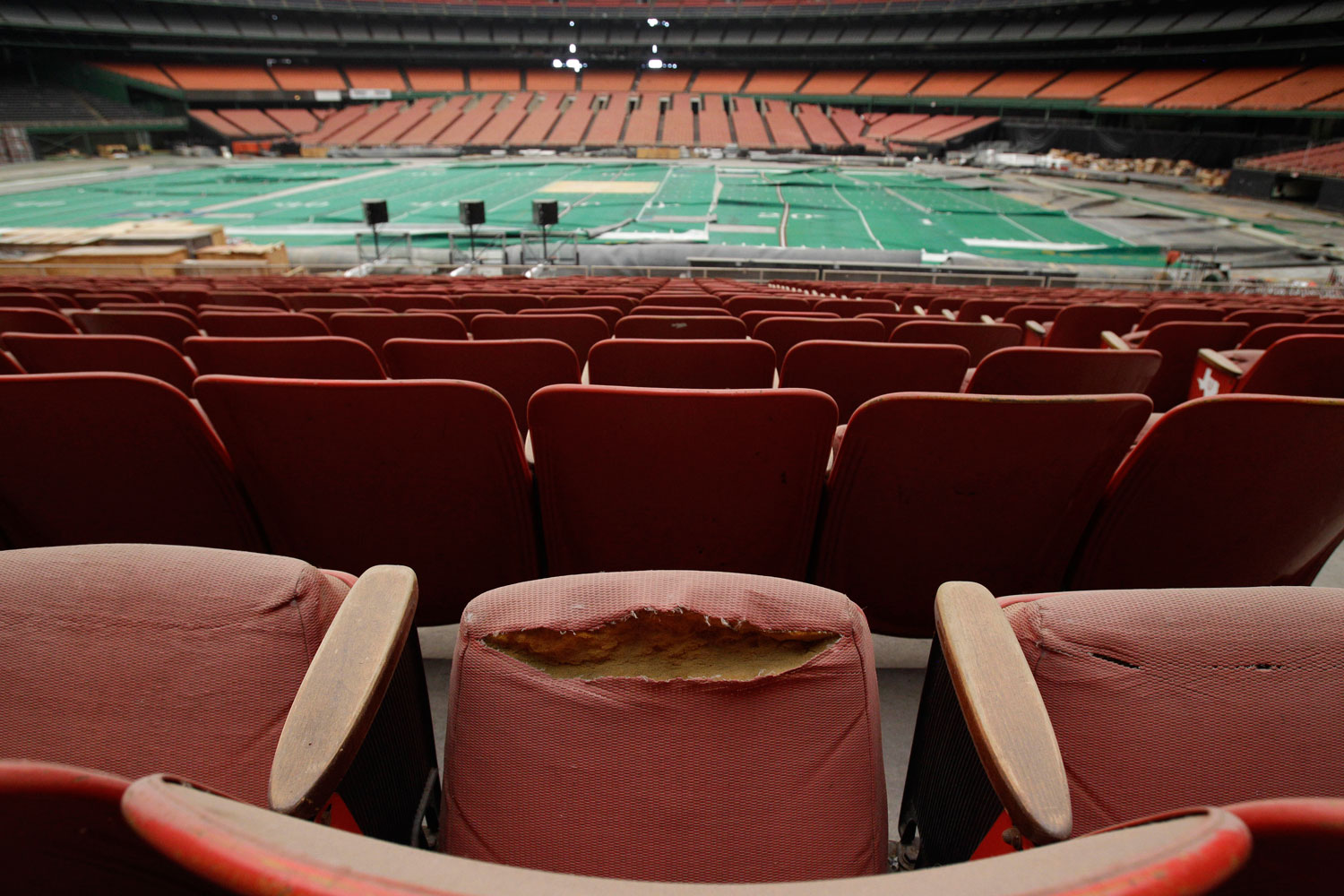- A good stadium can make or break a sporting event, which is why the best arenas are so well known to fans around the world.
- But some formerly legendary arenas that once represented the peak of advancement have since slipped into oblivion and, in some cases, been demolished.
- Check out these stadiums’ stunning transformations from relevance and fame to obscurity and dilapidation.
- Visit Business Insider’s homepage for more stories.
Sporting events are about so much more than what happens on the field or court, and that’s why the best arenas are so well known to fans around the world.
But some formerly legendary arenas that once represented the peak of advancement have since slipped into oblivion. Legendary venues like the Pontiac Silverdome, once home to the Detroit Tigers and host of Super Bowl XVI, Wembley Stadium, which once hosted the Olympics and the World Cup, and the Houston Astrodome, the stadium that many Houston sports franchises called home, look very different than they did during their prime.
Check out these stadiums’ stunning transformations from relevance and fame to oblivion and, in some cases, disintegration:
Foxboro Stadium
Foxboro Stadium was constructed for a mere $6.7 million and officially became home to the New England Patriots in 1971.

Source: AP
Many noteworthy Patriot games took place at the iconic stadium, but perhaps the most notable is the team's final showing at Foxboro.

Known now as the "Tuck Rule" game, the snowy 2001 AFC Divisional Playoff game between the Patriots and the Oakland Raiders hinged on an apparent fumble that was reversed due Tom Brady's arm "moving forward" at the time he lost the football. New England went on to win 16-13 in overtime.

Foxboro Stadium hosted some impressive sporting events outside of football as well. The arena was the site of multiple World Cup games, including the one in which Argentinian soccer legend Diego Maradona scored his final World Cup goal.

And beyond the world of sports, music icons from Madonna and Elton John to Metallica, Guns N' Roses, and Mick Jagger performed at Foxboro Stadium.

By the 1990s, Foxboro Stadium had become obsolete relative to newer, more high-tech stadiums across the country. After the completion of the 2001 postseason, Foxboro was demolished and replaced by Gillette Stadium.

Pontiac Silverdome

The Pontiac Silverdome was once one of the greatest arenas in professional sports.

After opening in 1975, the Pontiac Silverdome became the home of the Detroit Lions. It was the largest stadium in the NFL for 22 years.

Source: MLive.com
From 1978 to 1988, the Silverdome was also home to the NBA's Detroit Pistons.

Source: MLive.com
The arena played host to Super Bowl XVI in 1982.

The San Francisco 49ers defeated the Cincinnati Bengals 26-21 and celebrated by carrying head coach Bill Walsh off the field.

With the Lions' move to Ford Field in 2002, the Silverdome lost its major tenant and all of its former glory.

Source: MLive.com
The stadium — which once played host to the World Cup, the Pope, and Wrestlemania — officially closed in 2006.

Source: MLive.com
The city sold the abandoned stadium to a Toronto-based Triple Investment Group for $583,000 (less than 1% of the original cost to build the facility) in 2009. The arena reopened in 2010.

Source: MLive.com
Just three years later, disaster struck when a winter storm caused the roof of the arena to cave in, leaving the entire venue in tatters.

After the new owners failed to sell the dome for $30 million, the city demolished the once-great arena in 2017.

Wembley Stadium
One of the most legendary stadiums in all of Europe, Wembley Stadium opened in London in 1923.

The arena was home to the 1948 Summer Olympics.

The stadium was also where captain Bobby Moore and the England squad defeated Germany to win its first and only World Cup in 1966.

And Queen, The Who, U2, David Bowie, and others performed at Wembley Stadium during the legendary Live Aid benefit concert in 1985.

The stadium was crumbling by the time it closed in 2000, and it was demolished three years later.

The new Wembley Stadium opened in its place in 2007.

Tiger Stadium
Tiger Stadium — another beloved Detroit-area arena — fell from grace at the turn of the century.

Located in the Corktown neighborhood of Detroit, the stadium first opened in 1912 as Navin Field.

Source: ESPN
Primarly known as home to the Detroit Tigers from 1912 to 1999, Tiger Stadium was also home to the Detroit Lions for 34 years.

Source: ESPN, Detroit Athletic Co.
The stadium hosted the 1941, 1951 and 1971 MLB All-Star Games.

It was also where New York Yankees legend Lou Gehrig famously benched himself during what would be the final game of his career due to his progressive ALS — a disease now known by his name.

Source: SBNation
By the mid-1990s, Tiger Stadium had grown outdated, so the team began constructing a new stadium in 1997. The Tigers played their final season in the much-beloved ballpark two years later.

Source: MLB.com
After efforts to preserve the stadium were rejected by the city, Tiger Stadium was demolished in a years-long process.

Source: ESPN
The demolition was completed in 2009.

Source: ESPN
Now all that remains is the original field.

Houston Astrodome
The Houston Astrodrome — the world's first dome stadium — was so famous and legendary that it was dubbed the "Eighth Wonder of the World."

The dome was home to the MLB's Houston Astros from its opening in 1965 to 1999.

Source: Ballparksofbaseball.com
It was also home to the NFL's Houston Oilers — now the Tennessee Titans — and, more briefly, the NBA's Houston Rockets.

Source: Ballparksofbaseball.com
Though the stadium was known for hosting baseball, basketball, and football games, many legendary events outside of those sports took place inside the dome.

Tennis great Billie Jean King famously defeated Bobby Riggs in the battle of the sexes at the Astrodome in 1973.

And three-time World Heavyweight Boxing Champion Muhammad Ali knocked out Cleveland Williams there in 1966.

Even Elvis Presley performed at the Astrodome. He gave a series of performances there in 1970.

Source: Chron.com
The Astrodome was closed after being cited for code violations in 2008.

Source: Chron.com
And ever since, the interior has deteriorated.

The turnstiles were quite literally bent out of shape.

And the once bright-red seats became dirty and tattered.

Still, many people felt connected to the once-legendary arena, and plans to refurbish the Astrodome cropped up soon after it closed.

In 2013, Houston voters opted against allocating $217 million to turn the stadium into a giant convention center and exhibition space.

Source: ABC13
In 2018, the Harris County commissioners finally approved a $105 million project to renovate the Astrodome into more than 500,000 square feet of rentable space.

Source: Houston Business Journal
Washington Coliseum
The Washington Coliseum — otherwise known as Uline Arena — was home to professional basketball teams of multiple leagues, including the Washington Capitols of the NBA.

But the arena was more famous for hosting events outside of the sports world.

Eleanor Roosevelt once hosted a party for President Franklin D. Roosevelt at the famed venue.

Malcolm X once gave a speech there.

And, most famously, The Beatles performed their first-ever North American concert there.

They played for 8,092 adoring fans at a sold-out Washington Coliseum on February 11, 1964, just two days after their famous appearance on The Ed Sullivan Show.

Source: Ultimateclassicrock.com
After a riot broke out during a 1967 performance by The Temptations forced the venue to stop hosting concerts, things went downhill for the Coliseum. For a time, the arena acted as a jail. It was also once a trash transfer station. By 2011, it had become a parking garage and has since been transformed into office spaces.

Source: DC Curbed
An REI store now sits in the Coliseum's former location. They've preserved a few original seats from the famous arena as a wall decoration.

Source: Greater Greater Washington
Miami Marine Stadium
Miami Marine Stadium was constructed on Virginia Key in 1963.

Source: Miami Herald
It was intended to host crowds during powerboat races, but became famous after hosting concerts and events with the likes of Richard Nixon and Sammy Davis Jr.

In September 1992, just a month after Hurricane Andrew ravaged Florida, the structure was deemed unsafe and subsequently closed down.

Source: Miami Herald
The stadium was slated to be demolished by the city as graffiti built up on its walls.

Source: Miami Herald
But famous artists Gloria Estefan, Jimmy Buffett, and others teamed up to try to save the historic site.

And as of 2018, the City of Miami committed $42 million to clean up the stadium and establish a park around it.

Source: The Chronicle
Candlestick Park
Candlestick Park was first proposed as the stadium for the MLB's New York Giants, who were planning to move to the West Coast.

Source: Stadiums of Pro Football
Construction of the 45,000-seat stadium began in August 1958.

Source: Stadiums of Pro Football
And, when all was said and done, the ball park cost $15 million to complete.

Source: Stadiums of Pro Football
The newly-minted San Francisco Giants played their first game there in April 1960.

The Oakland Raiders — then a part of the American Football League — played part of the 1960 and 1961 season at Candlestick Park.

The San Francisco 49ers moved in from Kezar Stadium for the 1971 season and made Candlestick Park their home stadium for more than 40 years.

Source: Stadiums of Pro Football
Over the years, the arena was home to five Super Bowl Champion teams and multiple Hall of Fame players, including wide receiver Jerry Rice and quarterbacks Joe Montana and Steve Young.

Source: Stadiums of Pro Football
The Giants moved out of Candlestick Park after the 1999 MLB season. At the time of their final home game, it was unclear whether the team would relocate to Florida or to a different stadium in the Bay Area. They chose the latter.

The 49ers stayed at "The Stick" for another 13 years, playing their final home game there in December 2013.

Source: Stadiums of Pro Football
Paul McCartney played one last show at the once-modern arena in front of a crowd of 49,000 on August 14, 2014.

Source: Business Insider
Construction crews began the stadium's demolition less than a year later.

Source: Business Insider
Rather than using wrecking balls or dynamite, construction crews demolished the stadium piece by piece.

Source: Business Insider
And soon enough, the stadium was gone. The plot of land was meant to become a shopping mall, but work was suspended midway through 2018.

Source: NAI Northern California
Arsenal Stadium
Known colloquially as Highbury thanks to its location in Highbury, London, Arsenal Stadium was home to Arsenal Football Club from 1913 to 2006.

But the stadium was far more than just the "Home of Football." It hosted some cricket and baseball games as well as Henry Cooper and Muhammad Ali's fight for the 1966 World Heavyweight boxing title.

The stadium was on its last legs when it finally closed in 2006. The lot has since been converted into an apartment complex, while the soccer club has moved to Emirates Stadium in Holloway, London.

Now check out college football fans' favorite stadiums:


